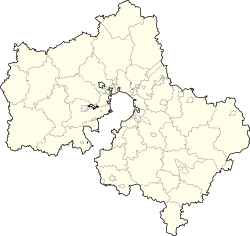Monino
This article needs to be updated. (September 2016) |
Monino
Монино | |
|---|---|
Location of Monino | |
| Coordinates: 55°50′24″N 38°11′53″E / 55.84000°N 38.19806°E | |
| Country | Russia |
| Federal subject | Moscow Oblast |
| Administrative district | Shchyolkovsky District |
| Population | |
| • Total | 22,821 |
| Time zone | UTC+3 (MSK |
| Postal code(s)[3] | |
| OKTMO ID | 46659154051 |
| Website | www |
Monino (Russian: Мо́нино) is an urban locality (a work settlement) in Shchyolkovsky District of Moscow Oblast, Russia, located 23 kilometers (14 mi) east of Moscow. Population: 22,821 (2010 Russian census);[1] 20,017 (2002 Census);[4] 18,582 (1989 Soviet census).[5]
History
[edit]Monino was founded in the Muninskaya Wasteland (Russian: Мунинская пустошь) on August 23, 1792. The name "Monino" or "Munin" can be translated from the Finno-Ugric languages as "My farm".[citation needed]
It is alleged that the history of the settlement can be traced to a small farm, whose owner was a man of Monin.[citation needed] In 1926, an airfield for heavy aircraft was built, becoming the first to house a heavy bomber brigade.[citation needed] The subsequent history of the village is closely connected with aviation. The status of urban-type settlement was conferred in 1946.[citation needed]

Until 1965, it was part of the Noginsk District.[citation needed]
Trivia
[edit]
The Central Air Force Museum in Monino is one of the world's largest aviation museums, and the largest for Russian aircraft. 173 aircraft and 127 aircraft engines are on display, and the museum also features collections of weapons, instruments, uniforms, artwork, and other air-related items. A library containing books, films, and photos is also accessible to visitors. Tours are given by ex-pilots. The museum opened its doors in 1958.
Monino was the former home of the Gagarin Air Force Academy, which closed in 2011 and remains home to the Chernoi air base.
Monino is home to VVA-Podmoskovye, current champions of the Professional Rugby League, Russia's national rugby union competition. VVA have won the title eight times, in 1993, 2003, 2004, 2006, 2007, 2008, 2009, 2010. They were also nine-time winners of the Soviet Championship.
Monino can be reached from the Yaroslavsky Rail Terminal in central Moscow by the suburban elektrichka commuter train.
References
[edit]- ^ Jump up to: a b Russian Federal State Statistics Service (2011). Всероссийская перепись населения 2010 года. Том 1 [2010 All-Russian Population Census, vol. 1]. Всероссийская перепись населения 2010 года [2010 All-Russia Population Census] (in Russian). Federal State Statistics Service.
- ^ "Об исчислении времени". Официальный интернет-портал правовой информации (in Russian). 3 June 2011. Retrieved 19 January 2019.
- ^ Почта России. Информационно-вычислительный центр ОАСУ РПО. (Russian Post). Поиск объектов почтовой связи (Postal Objects Search) (in Russian)
- ^ Federal State Statistics Service (21 May 2004). Численность населения России, субъектов Российской Федерации в составе федеральных округов, районов, городских поселений, сельских населённых пунктов – районных центров и сельских населённых пунктов с населением 3 тысячи и более человек [Population of Russia, Its Federal Districts, Federal Subjects, Districts, Urban Localities, Rural Localities—Administrative Centers, and Rural Localities with Population of Over 3,000] (XLS). Всероссийская перепись населения 2002 года [All-Russia Population Census of 2002] (in Russian).
- ^ Всесоюзная перепись населения 1989 г. Численность наличного населения союзных и автономных республик, автономных областей и округов, краёв, областей, районов, городских поселений и сёл-райцентров [All Union Population Census of 1989: Present Population of Union and Autonomous Republics, Autonomous Oblasts and Okrugs, Krais, Oblasts, Districts, Urban Settlements, and Villages Serving as District Administrative Centers]. Всесоюзная перепись населения 1989 года [All-Union Population Census of 1989] (in Russian). Институт демографии Национального исследовательского университета: Высшая школа экономики [Institute of Demography at the National Research University: Higher School of Economics]. 1989 – via Demoscope Weekly.





